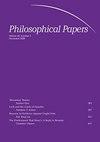投射适应性
IF 1.3
3区 哲学
0 PHILOSOPHY
引用次数: 1
摘要
摘要适度不变量是知识属性的正统语义(即,形式为S知道/不知道Φ的句子)。近年来,它已经失宠,很大程度上是因为它无法解释为什么普通说话者在几种情况下有这样的直觉,即某些知识归因的话语是恰当的,而另一些则是不恰当的(恰当直觉)。为了解决这个问题,适度不变量发展了各种我称之为非语义理论(又称错误理论),他们声称这些理论独立于适度不变量语义,解释了相关的幸福直觉。一些评论家的回应是,由于以下一个或多个原因,这些非语义理论是不可信的:(i)它们没有实证数据或既定理论的基础;(ii)它们没有解释所有相关的幸福直觉;(iii)它们是临时的;或者(iv)它们实际上解释了太多的幸福直觉,从而破坏了适度不变量的情况。我发展了一种新的非语义理论——投射自适应理论——我认为它避开了上述(I)至(iv)的问题。本文章由计算机程序翻译,如有差异,请以英文原文为准。
Projective Adaptivism
Abstract Moderate invariantism is the orthodox semantics for knowledge attributions (i.e., sentences of the form ⌜S knows/doesn’t know that Φ⌝). In recent years it has fallen out of favour, in large part because it fails to explain why ordinary speakers have the intuition that some utterances of knowledge attributions are felicitous and others infelicitous (felicity intuitions) in several types of cases. To address this issue moderate invariantists have developed a variety of what I call non-semantic theories (aka error theories) which they claim account for the relevant felicity intuitions independently of moderate invariantist semantics. Some critics have responded by arguing that these non-semantic theories are implausible for one or more of the following reasons: (i) they do not have a basis in empirical data or established theory; (ii) they do not account for all of the relevant felicity intuitions; (iii) they are ad hoc; or (iv) they in fact explain too many felicity intuitions and thus undermine the case for moderate invariantism. I develop a new non-semantic theory––projective adaptivism––that I argue escapes issues (i) to (iv) above.
求助全文
通过发布文献求助,成功后即可免费获取论文全文。
去求助
来源期刊

Philosophical Papers
PHILOSOPHY-
CiteScore
2.10
自引率
0.00%
发文量
18
期刊介绍:
Philosophical Papers is an international, generalist journal of philosophy edited in South Africa Original Articles: Articles appearing in regular issues are original, high-quality, and stand-alone, and are written for the general professional philosopher. Submissions are welcome in any area of philosophy and undergo a process of peer review based on initial editor screening and refereeing by (usually) two referees. Special Issues: Topic-based special issues are comprised of both invited and submitted papers selected by guest editors. Recent special issues have included ''Philosophy''s Therapeutic Potential'' (2014, editor Dylan Futter); ''Aging and the Elderly'' (2012, editors Tom Martin and Samantha Vice); ''The Problem of the Criterion'' (2011, editor Mark Nelson); ''Retributive Emotions'' (2010, editor Lucy Allais); ‘Rape and its Meaning/s’ (2009, editor Louise du Toit). Calls for papers for upcoming special issues can be found here. Ideas for future special issues are welcome.
 求助内容:
求助内容: 应助结果提醒方式:
应助结果提醒方式:


